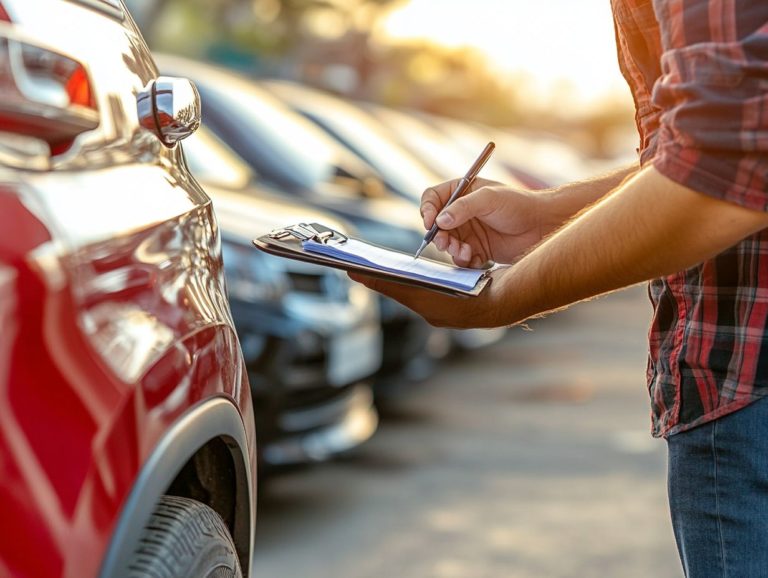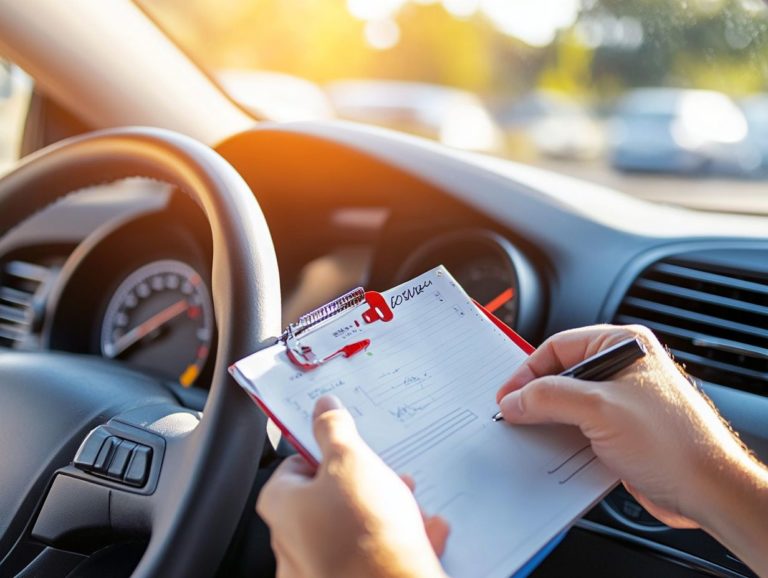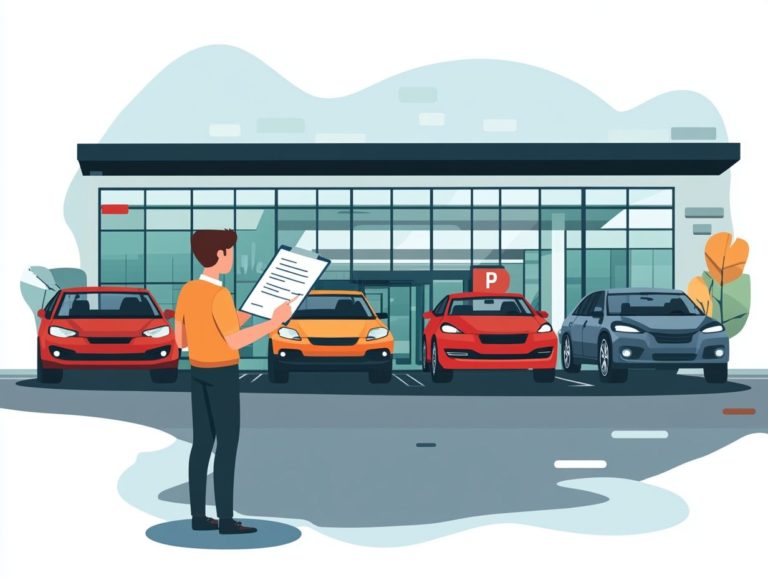5 Signs You Found a Good Used Car Deal
Finding the perfect used car can seem overwhelming, but it doesn t have to be! Understanding what to look for can transform the experience into a smoother and far more rewarding journey.
This article delves into five key indicators that reveal you ve discovered a remarkable deal, from evaluating the price and title to grasping the nuances of maintenance history and assessing seller trustworthiness. It also discusses the benefits and drawbacks of purchasing used vehicles, essential research strategies, and ways to safeguard yourself throughout the process.
Whether you re embarking on your first car-buying adventure or seeking to upgrade your ride, you ll uncover invaluable insights that empower you to make an informed decision.
Contents
- Key Takeaways:
- 1. The Price Is Below Market Value
- 2. The Car Has a Clean Title
- 3. The Car Has a Good Maintenance History
- 4. The Car Passes a Thorough Inspection
- 5. The Seller Is Trustworthy and Transparent
- What Are the Benefits of Buying a Used Car?
- What Are the Potential Risks of Buying a Used Car?
- How Can You Research the Market Value of a Used Car?
- What Are the Different Types of Car Titles and Their Implications?
- What Are the Key Things to Look for in a Car’s Maintenance History?
- What Should Be Included in a Thorough Inspection of a Used Car?
- What Are Some Red Flags to Watch Out for When Buying a Used Car?
- How Can You Protect Yourself When Buying a Used Car from a Private Seller?
- What Are the Benefits of Buying a Certified Pre-Owned Car?
- How Can You Negotiate a Good Deal on a Used Car?
- What Are the Key Documents and Steps Involved in Buying a Used Car?
- Frequently Asked Questions
- 1. What are the top signs of a good used car deal?
- 2. How important is it to consider the price when looking for a good used car deal?
- 3. What does a clean title mean, and why is it important?
- 4. Should I be concerned if a used car has high mileage?
- 5. Can I trust the maintenance records provided by the seller?
- 6. Should I always have a mechanic inspect a used car before purchasing?
Key Takeaways:

A below market value price is a good indicator of a good used car deal.
A clean title is essential for a good used car deal, as it ensures there are no hidden issues or problems with the car.
A good maintenance history is important as it shows the car has been well taken care of and may have fewer potential issues in the future.
1. The Price Is Below Market Value
Finding a used car priced below market value is a rare gem for discerning buyers like you. It offers the chance to save money while securing a dependable vehicle.
Determining the actual market value of a vehicle is essential. Resources like Kelley Blue Book are invaluable tools in this endeavor. By entering the car s make, model, and year, you can obtain a detailed estimate of its worth, giving you the power to identify fair pricing and avoid the trap of overpaying.
Purchasing a vehicle at a lower price not only lessens your monthly payments, enhancing your financial flexibility. It also opens doors for investing in additional features, maintenance, or even upgrades that elevate both performance and enjoyment.
2. The Car Has a Clean Title
A clean title is absolutely crucial when you’re in the market for a used car. It signals that the vehicle has likely avoided major accidents or significant damage, making it easier for you to buy.
A clean title affects the car’s resale value and reliability. To determine the title status, you should definitely consider using vehicle history report services like Carfax. These reports offer in-depth information about accidents, repairs, and title changes, equipping you to make informed decisions.
Being mindful of a salvaged or rebuilt title meaning a car that has been significantly damaged and repaired can have serious ramifications. A car with such titles may have undergone extensive repairs or damage, which could lead to unforeseen issues later on. Understanding these factors not only helps you make a wise investment but also ensures your long-term safety and satisfaction on the road.
3. The Car Has a Good Maintenance History
A thorough examination of a used car’s maintenance history can reveal crucial insights into past repairs and services. This allows you to assess the vehicle’s overall condition and mitigate the risk of facing mechanical defects after your purchase.
By looking into these records, you can uncover whether the vehicle has received regular oil changes, tire rotations, and other essential routine services that keep the engine and overall systems functioning optimally. Be sure to take note of any major repairs or recurring issues, as these may indicate underlying problems that could impact reliability in the long run.
A well-maintained vehicle not only offers you peace of mind but also significantly enhances the engine’s longevity. This ensures smoother performance and potentially saves you from costly repairs down the road.
4. The Car Passes a Thorough Inspection
A thorough inspection by a trusted mechanic is essential before finalizing a used car purchase. This step uncovers critical information about the vehicle’s condition, ensuring it meets your must-have features and safety requirements.
This careful check typically involves an examination of mechanical functions, including the engine and transmission, to assess performance and reliability.
Key safety features, such as anti-lock brakes and emergency braking systems, are scrutinized to ensure they operate effectively, offering maximum protection in unexpected events.
The mechanic will also look into digital safety features like advanced driver assistance systems, which include lane-keeping assistance and adaptive cruise control. A post-purchase inspection can help you find any problems that may arise after the sale.
This proactive approach allows for timely repairs, minimizing future expenses and ensuring your investment remains sound.
5. The Seller Is Trustworthy and Transparent
Building trust with the seller is essential in the used car buying process. A trustworthy and transparent dealer will provide you with vital information about the vehicle, such as accident history, maintenance records, and any promises made during negotiations.
To assess a seller’s credibility, read reviews and testimonials from previous customers. This will give you valuable insight into their experiences.
Feel free to ask detailed questions about the vehicle s history service records, previous owners, and reasons for the sale are all fair game.
Another important step is ensuring that every verbal commitment made by the seller is documented in the purchase agreement. This protects you in case any disputes arise down the line.
This careful scrutiny not only boosts your confidence but also gives you the power to make an informed and responsible decision.
What Are the Benefits of Buying a Used Car?

Buying a used car has incredible perks! You’ll enjoy significant cost savings compared to new models, access to a broader selection of vehicles that cater to your specific needs, and the chance to acquire a reliable model that s already demonstrated its worth on the road.
One of the most compelling reasons to consider a pre-owned vehicle is the lower depreciation rates, enabling you to retain more of your initial investment. Additionally, used cars typically come with reduced insurance costs, providing you with further financial relief.
Don t miss out on amazing deals act fast! By keeping an eye on saving ads and online classifieds, as well as setting alerts on major automotive websites, you can uncover exceptional deals within your budget.
Websites dedicated to used cars often showcase promotions and price cuts, making your search efficient and rewarding as you look for the perfect model that meets your requirements.
What Are the Potential Risks of Buying a Used Car?
Buying a used car can be a great decision, but it also comes with risks you need to keep on your radar. You might encounter undisclosed mechanical defects, murky accident histories, or hidden issues that only surface during a vehicle history check.
These uncertainties can lead to unexpected financial strains and safety concerns once you ve made the purchase. That’s why it s crucial for you, as a prospective buyer, to carry out thorough inspections and acquire detailed vehicle history reports.
A comprehensive inspection can reveal underlying problems that aren’t immediately apparent, while a vehicle history report delivers vital information about previous ownership, accidents, and service records.
By taking these essential steps, you can significantly reduce the likelihood of unwelcome surprises later on and make informed, confident choices about your used car investments.
How Can You Research the Market Value of a Used Car?
Researching the market value of a used car is essential for making a smart purchase. By checking advertisements and comparing prices based on average mileage, you can ensure you’re paying a fair price that reflects the vehicle’s condition.
Utilizing online resources like Kelley Blue Book and Edmunds makes this process significantly easier. These platforms offer comprehensive tools that consider various factors, including the make, model, year, and mileage of the vehicles. Entering specific details will help you obtain a reliable estimate of your desired car’s worth.
Analyzing local listings provides insights into competitive pricing in your area, helping you spot deals that fit your budget. Don’t overlook vehicles that may be slightly above your estimated price; investing a little more now could save you money on repairs and future costs down the line.
What Are the Different Types of Car Titles and Their Implications?
Understanding the various types of car titles is crucial for you as a used car buyer. Each title type clean title, salvage title, or rebuilt title comes with its own set of implications regarding the vehicle’s history, resale value, and reliability.
These titles serve as a window into a car’s past and significantly influence insurance costs and future financial commitments. A clean title generally means the vehicle hasn’t suffered substantial damage or been involved in major accidents, resulting in lower insurance premiums and greater peace of mind for you as a buyer.
A salvage title means the car was considered totaled by an insurance company, which raises concerns about its safety and reliability. Make sure to closely examine the title it can save you from future headaches!
As you evaluate a vehicle’s title status, it s essential to scrutinize the title type and conduct thorough research. This diligence will help you understand how these factors might impact both your immediate expenses and long-term investment.
What Are the Key Things to Look for in a Car’s Maintenance History?
When reviewing a car’s maintenance history, pay close attention to key indicators like regular service intervals and records of any mechanical defects. This diligence is essential for making a wise investment.
Be particularly mindful of crucial records, such as timing belt replacements, which prevent engine damage, along with the brake service history that directly affects safety. Comprehensive documentation of any major repairs can shed light on the car’s past challenges and how effectively they ve been addressed.
By examining these aspects, you can gain valuable insights into the vehicle’s overall condition and longevity, ensuring that your decision is one that will endure.
What Should Be Included in a Thorough Inspection of a Used Car?
A thorough inspection of a used car should encompass various critical aspects. You’ll want to evaluate the vehicle’s condition, test must-have features like safety tech, and gather insights from a trusted mechanic to ensure its overall reliability.
To streamline this process, compile a checklist that highlights vital areas to assess before making a purchase decision:
- Start by examining engine performance listen for unusual noises and check fluid levels for any discrepancies.
- Next, evaluate the tire condition by inspecting tread wear and ensuring proper inflation.
- Don t overlook essential safety features; confirm that parking sensors are functioning correctly and that lane assist is responsive.
- Lastly, verify the condition of the brakes and lights to ensure a comprehensive safety profile.
This meticulous approach empowers you to make a well-informed choice. Act quickly to secure the best deal it might not last long!
What Are Some Red Flags to Watch Out for When Buying a Used Car?

Identifying red flags when purchasing a used car is essential for steering clear of potential pitfalls. Common warning signs to watch for include inconsistent maintenance records, signs of mechanical defects, or an unclear accident history that could hint at deeper issues.
Pay close attention to observable conditions such as rust on critical components or strange noises during a test drive. These might indicate underlying problems. If the seller seems reluctant to provide essential documentation like service records or a vehicle history report, take that as a significant red flag.
It’s important to tackle these concerns right away. Consider requesting a professional inspection or insisting on transparency regarding any repairs or modifications.
Proactively engaging with sellers about these issues clarifies the vehicle’s past and gives you the power to make an informed decision, ensuring a more satisfactory purchase.
How Can You Protect Yourself When Buying a Used Car from a Private Seller?
When you re buying a used car from a private seller, it s essential to take specific steps to protect yourself.
- Start by obtaining a detailed vehicle history report and ensure that all terms of the sale are clearly outlined in a purchase agreement.
- Conduct a thorough inspection of the vehicle to uncover any potential issues that might not be immediately visible.
- Engaging a trusted mechanic can provide you with an unbiased assessment of the car’s condition, giving you peace of mind.
- Use comparable models in the market to negotiate a fair deal that truly reflects the vehicle’s value.
- Lastly, familiarize yourself with local regulations concerning private sales; this knowledge will help ensure compliance and avoid any legal complications down the road.
What Are the Benefits of Buying a Certified Pre-Owned Car?
Purchasing a certified pre-owned car brings you a wealth of advantages, including the peace of mind that comes from thorough inspections, manufacturer-backed warranties, and the chance to acquire late-model vehicles at competitive prices all from a reputable used car dealer.
The certification process involves a detailed check covering various parts of the car, such as the engine, transmission, brakes, and tires. This ensures that each vehicle meets strict quality standards. Not only does this identify any potential issues before they escalate, but it also significantly enhances the overall reliability of the cars you consider.
The warranty included with your certified pre-owned vehicle offers an extra layer of protection, setting it apart from traditional used cars. Feel confident in your purchase, knowing you re making a wise investment, bolstered by comprehensive vehicle checks and the support of trusted manufacturers.
How Can You Negotiate a Good Deal on a Used Car?
Negotiating a great deal on a used car requires a blend of preparation and strategy. You need to grasp the vehicle’s market value, understand the seller’s motivations, and effectively leverage dealer promises during discussions to secure favorable financing terms.
Start by presenting an initial offer below the asking price. This not only creates room for negotiation but also sets a tone for a more balanced discussion. Remember, being willing to walk away can be a powerful tactic; it showcases your confidence and reminds the seller that you have other options at your disposal.
Use any issues or repairs you noted to negotiate. Highlighting these can strengthen your position, prompting the seller to reconsider their price in light of necessary adjustments. By weaving these techniques together, you significantly enhance your chances of sealing a better deal.
Don’t miss out on the opportunity to ask the seller questions! Start shopping wisely today and make the best choice for your next ride!
What Are the Key Documents and Steps Involved in Buying a Used Car?
Understanding the key documents for buying a used car ensures a smooth transaction. You ll need a valid purchase agreement, a bill of sale, and a “we owe” document that shows dealer promises.
If financing is needed, gather your details first. Also, review the FTC Buyers Guide for helpful consumer protection tips.
Start with negotiations about the price and vehicle condition. Don’t forget to ask for a vehicle history report to keep everything transparent.
Every document serves a purpose. The bill of sale is proof of ownership transfer, while the “we owe” document secures promises from the dealership.
This careful approach boosts your buying experience and helps you avoid pitfalls.
Frequently Asked Questions
1. What are the top signs of a good used car deal?
Look for these five signs: 1. A price much lower than market value. 2. A clean title with no major accidents. 3. Low mileage for its age. 4. Complete maintenance records. 5. A positive inspection report from a trusted mechanic. Additionally, be aware of 7 signs you’re getting a good car deal to ensure you make the best purchase.
2. How important is it to consider the price when looking for a good used car deal?
The price is crucial when determining a good used car deal. A significantly lower price compared to market value could indicate underlying issues with the vehicle. To avoid pitfalls, consider these 5 ways to save money on a used car purchase and research the average price for the make and model of the car to ensure a fair deal.
3. What does a clean title mean, and why is it important?
A clean title means the car has not been in any major accidents or declared a total loss by an insurance company. It is important because a clean title generally indicates reliability and may lead to a higher resale value.
4. Should I be concerned if a used car has high mileage?
High mileage is not necessarily a red flag. Consider the car’s age and the type of driving it has undergone. A car with high mileage, regular maintenance, and mostly highway use may still be a good deal.
5. Can I trust the maintenance records provided by the seller?
While it’s always wise to get a second opinion, maintenance records can indicate how well the car has been cared for. Review these records carefully and ask for clarification on any significant repairs or replacements.
6. Should I always have a mechanic inspect a used car before purchasing?
Always get a trusted mechanic to check the car! They can identify potential issues not visible to the average buyer and inform you about the car’s overall condition. This can also help you negotiate a better deal or avoid costly repairs in the future.






